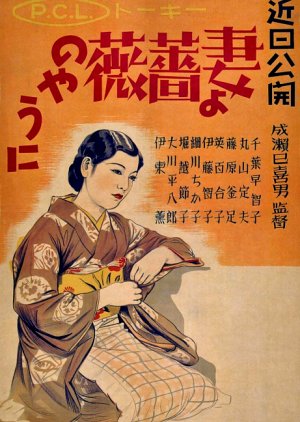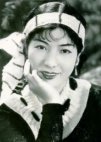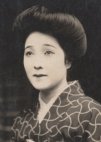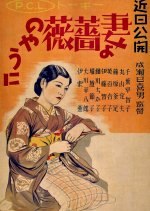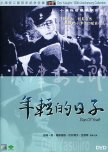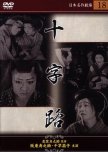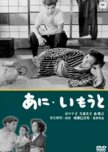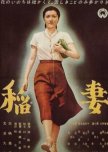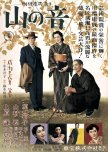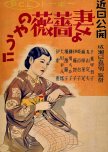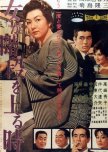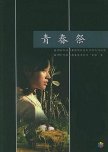- Français
- English
- magyar / magyar nyelv
- dansk
- Titre original: 妻よ薔薇のやうに
- Aussi connu sous le nom de: Kimiko , Tsuma yo Bara no You ni
- Scénariste et Réalisateur: Naruse Mikio
- Genres: Drame
Distribution et équipes
- Chiba SachikoYamamoto KimikoRôle principal
- Maruyama SadaoYamamoto ShunsakuRôle principal
- Hanabusa YurikoOyukiRôle Secondaire
- Horikoshi SetsukoShizue [Oyuki's daughter]Rôle Secondaire
- Fujiwara KamatariShingo [Etsuko's older brother]Rôle Secondaire
- Hosokawa Chikako[Shingo's wife]Rôle Secondaire
Critiques

"Each heart is different."
A few months after Naruse Mikio directed his first talkie, he created this film based on a play titled, “Two Wives.” Two Wives described the film much better than the submissive order “Wife! Be a Rose!” Had it not been a Naruse film, I might have skipped this title. I’ve learned to trust him where women were concerned, he was much more forward thinking than other directors at this time. While billed as a comedy, there was disappointment and pain behind the upbeat music and smiles.Kimiko and Seiji are planning to marry, all they need now is for the fathers to meet and hash out the transaction. The only problem being, Kimiko’s father left home to live with a geisha in the mountains around Nagano fifteen years ago. Aside from a meager money order that arrives each month, Kimiko and her mother have not heard from him in a long time. Kimiko works in an office supplying much of their income while her mother writes poetry for the newspaper and teaches a poetry class for free. Etsuko spends money freely on her own clothes, living in her own little world. Kimiko determines to visit her father and bring him back to not only arrange her marriage but also to free him from the clutches of Oyuki, the woman he is living with.
In Naruse’s first talkie five months prior, the sister who dressed in Western style clothes was derided as a “modern girl.” Kimiko often dressed in Western clothing and was portrayed as independent and yet also filial. Despite Kimiko believing that “Men like a wife who acts childish and cajoling…or motherly and protective,” she tended to be neither. Seiji admired her fierceness and had no problem with her traveling alone across the country to cross swords with the harridan controlling her father. “I guess you’re as tough as she is.” When things turn out to be different than what she believed, Kimiko rolled with the punches and opened her mind and heart. There was still heartbreak aplenty when attempting to be filial to two parents with different hearts. Many a child of divorced parents has had to come to terms with adults who cannot live together.
Unlike Three Sisters with Maiden Hearts where Naruse overused the new ability to employ sound, in this film, the music flowed evenly and organically throughout the story. The acting for 1935 was exemplary, forgoing melodramatic tics. Chiba Sachiko as Kimiko conveyed the longing and despair behind her smile as she dealt with conflicting emotions regarding her father and mother. With Naruse’s characters, still waters ran deep, belying powerful eddies and currents guiding their actions.
Wife! Be a Rose! could easily be reworked in the present as a film about the different ways families exist and coexist. Love doesn’t always come in the package we expect nor does love make every relationship work. Sometimes love means acceptance of who people are and also being able to let go.
7 February 2025
Cet avis était-il utile?
Recommandations
There have been no recommendations submitted. Be the first and add one.

